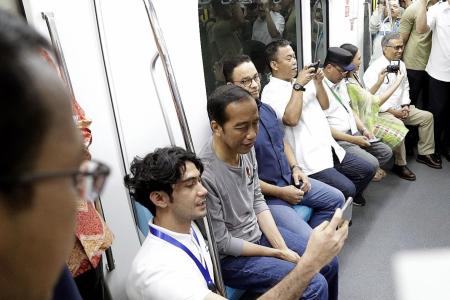Traffic-choked Jakarta inaugurates mass rapid transit system
JAKARTA: Indonesia's capital inaugurated its first Mass Rapid Transit (MRT) system on Sunday, a US$1.1 billion (S$1.5 billion) project seen as crucial to tackling some of the world's worst traffic congestion.
President Joko Widodo and other officials joined a ceremony in Jakarta to give a green light for the 16km line, almost six years after construction began on the Japanese-backed project.
Tens of thousands of excited Jakartans were in attendance and eager to try riding on the subway for the first time, mobbing the President for selfies while music blared and traditional performers danced on a nearby stage.
"Honestly I am so happy," office worker Mutia Fitrianti told AFP. "Now we don't have to go abroad just to ride an MRT." The train system runs above and below ground and stretches from the central Hotel Indonesia to the southern reaches of the South-east Asian megalopolis of some 30 million people.
It aims to cut travel times between the two points to just 30 minutes from around two hours, offering some relief to frustrated commuters long used to spending much of their day stuck in traffic.
The new line is set to open to the public on Monday, with tickets free during the first week.
Construction on a second line linking downtown to Jakarta's northern port is also kicking off with completion slated for 2024, and more lines are envisioned in the future.
A separate elevated rail network is also being built to link satellite cities with Jakarta.
The public transit projects are part of a sweeping infrastructure push that Mr Joko hopes will boost the fortunes of South-east Asia's biggest economy - and get him re-elected in national polls next month.
"If we have an integrated transportation system, it will be easier for people to go places and they will leave their cars or motorcycles at home," Mr Joko told journalists on Sunday.
Over the past decade, rising incomes in the country of 260 million have created a ballooning middle class and sent vehicle ownership soaring.
But that has also brought hazardous air pollution and annual economic losses that run into the billions as cars crawl along the capital's roadways in the steamy tropical heat - alongside an underused bus system.
Environmentalists hope that the new line will cut traffic-linked carbon emissions by about half. - AFP
Get The New Paper on your phone with the free TNP app. Download from the Apple App Store or Google Play Store now



